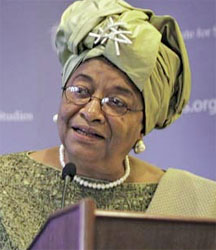WASHINGTON, (Reuters) – Liberian President Ellen Johnson-Sirleaf yesterday defended her government’s record on good governance and transparency, following an independent audit that cast doubt on her anti-corruption efforts.
She said a recent audit of resource contracts by accounting firm Moore Stephens contracts had been commissioned to fix, and not hide, problems in the West African country.
The independent audit showed that almost all the $8 billion worth of resource contracts signed by Liberia since 2009 violated the country’s laws and showed widespread irregularities.

“We commissioned the audit, we wanted to know what went wrong because we want to set it right and that is exactly what we have done,” Sirleaf told a Thomson Reuters Newsmaker event.
She said, however, that her government was slow to react to the audit’s findings, but that it had since submitted a report to the country’s transparency watchdog LEITI, co-chaired by the Finance Ministry, which commissioned the audit.
“The government is doing what it can, but there are problems,” she acknowledged. She noted that Liberia was one of the first African states to join the Extractive Industries Transparency Initiative (EITI), a global program that tries to help governments avoid corruption.
Sirleaf, a Nobel Peace Prize winner and Africa’s first freely elected female president in 2006, has won international acclaim for her “zero tolerance” stance against corruption and for turning around a country devastated by 14 years of sporadic civil war that ended in 2003.
Since then, Liberia’s enormous resource wealth has attracted a flood of interest from foreign investors. The government has signed major mining and oil contracts including a $1.5 billion deal with Anglo-Australian miner BHP. It has also signed offshore deals with Chevron Petroleum and Exxon Mobil.
Sirleaf’s opponents allege corruption, nepotism and mismanagement in Liberia’s resources sectors and the audit report put the government in the uncomfortable position of deciding how to fix the problems.
Asked whether the audit’s findings had undermined her momentum in fighting graft, Sirleaf replied: “Not really, we’ve had people ask questions and they should, but we also want to know what went wrong and we want to correct it.”




